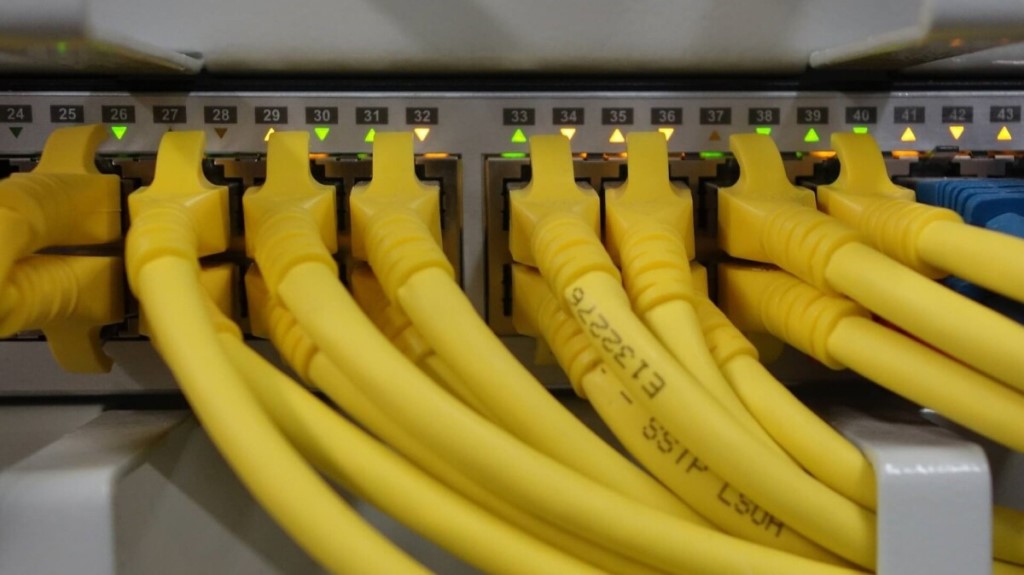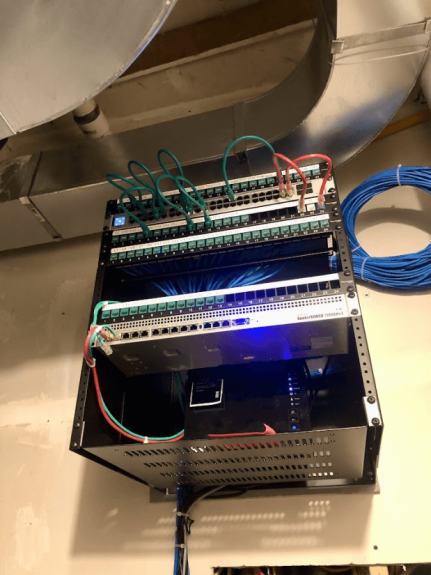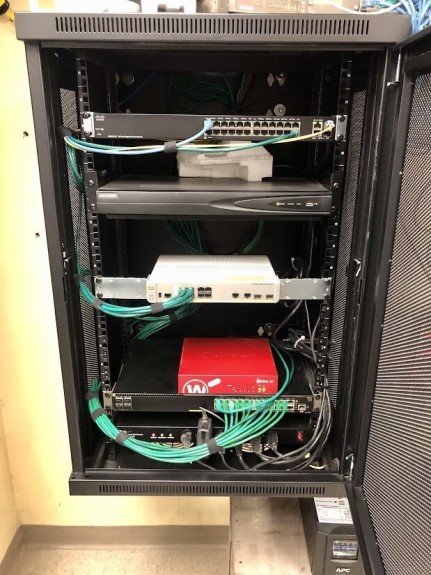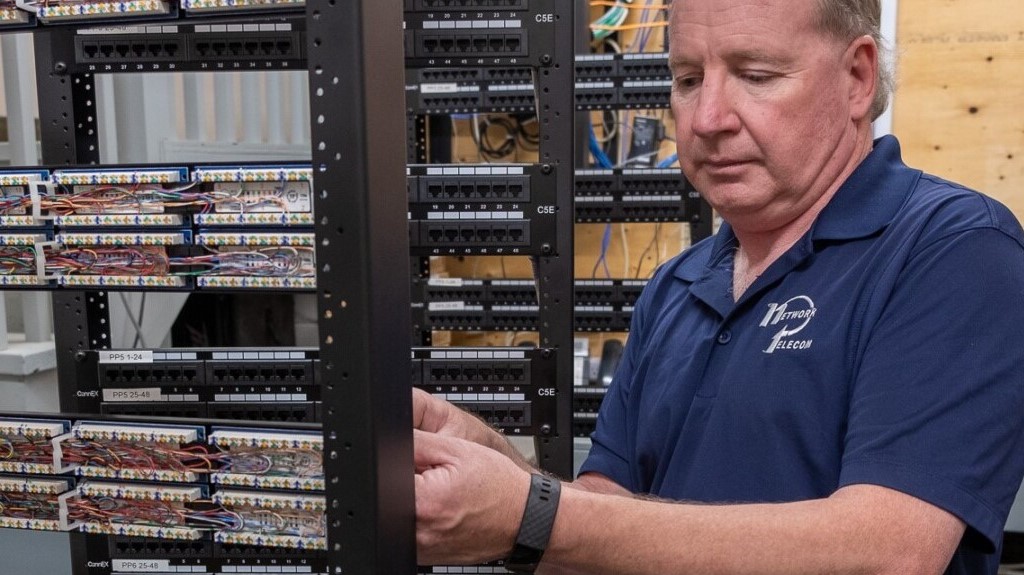In today’s digital age, a well-planned network infrastructure is essential for the success of any new business facility. From connecting computers and servers to facilitating communication and data sharing, network cabling provides the backbone for your operations.
Click on the following sections to discover how a robust network infrastructure can enhance your business’s efficiency, productivity, and overall success:
- Importance of a Well-Planned Network Infrastructure
- Systems that Rely on Network Cabling
- Types of Network Cabling
- Network Design Considerations
- Benefits of Professional Installation
- Choosing a Network Cabling Company
- Additional Considerations for Different Systems
Building a new business facility? Contact the cabling specialists at Network Telecom to help make your installation a success.
New Business Facility – What You Need to Know about Cabling
1. Importance of a Well-Planned Network Infrastructure

Make sure you have a well-planned network infrastructure for your new business facility.
A well-planned network infrastructure is the backbone of any modern business facility. It provides the connectivity and communication channels essential for seamless operations, enhanced productivity, and business growth. Here’s why:
- Improved Efficiency: A robust network infrastructure ensures efficient data flow and communication, minimizing downtime and bottlenecks. This translates to faster access to information, enhanced collaboration, and streamlined processes.
- Enhanced Security: A well-designed network can help protect your business from cyber threats like hacking, data breaches, and malware attacks. Strong security measures, such as firewalls and encryption, can safeguard your sensitive information.
- Scalability: A future-proof network infrastructure allows your business to grow and adapt without major disruptions. It can accommodate increased data traffic, additional devices, and new technologies as your business expands.
- Cost-Effectiveness: A well-planned network infrastructure can help reduce long-term costs by minimizing downtime, improving efficiency, and preventing security breaches.
- Enhanced Customer Experience: A reliable network infrastructure is crucial for providing excellent customer service. It ensures smooth communication, efficient data access, and timely responses to customer inquiries.
In today’s digital-driven world, a well-planned network infrastructure is no longer a luxury but a necessity for businesses of all sizes. By investing in a robust and scalable network, you can set your business up for success and position yourself for future growth.
2. Systems that Rely on Network Cabling

Your new business facility will need a local area network to connect its computers, servers, and other devices.
Network cabling is the foundation for a wide range of essential business systems. Here are some key systems that rely on network infrastructure:
- Local Area Network (LAN): A local area network connects computers, servers, printers, and other devices within a building or campus.
- Wide Area Network (WAN): A wide area network connects multiple LANs across a larger geographical area, enabling communication and data sharing between remote locations.
- Internet Connectivity: Your internet connectivity provides you with access to the global internet, facilitating communication, research, and online transactions.
- Voice Over Internet Protocol (VoIP): VoIP enables voice communication over the internet, offering features like call forwarding, voicemail, and video conferencing.
- Wireless Networks (WiFi): WiFi provides you with wireless internet access, allowing devices like laptops, smartphones, and tablets to connect to the network.
- Security Systems: Your security system needs network cabling to connect security cameras, access control systems, and alarm systems, enabling remote monitoring and management.
- Building Automation Systems: Building automation systems often rely on network connectivity for centralized management. These systems control various building functions like lighting, HVAC, and security.
These systems, and many others, depend on a reliable network infrastructure to function effectively. Well-designed and maintained network cabling ensures seamless communication, data transfer, and overall business operations.
3. Types of Network Cabling

There are many different types of network cabling. You need to get the right kind for your new business facility.
Understanding the different types of network cabling is essential for selecting the right solution for your business. Here are some of the most common types and their characteristics:
- Cat5e: A popular choice for standard Ethernet networks, Cat5e cables support speeds up to 1000 Mbps (gigabit Ethernet). They are suitable for most business applications, including data centers, offices, and small businesses.
- Cat6: An upgraded version of Cat5e, Cat6 cables support speeds up to 10 Gbps. They are ideal for high-performance networks, such as data centers and demanding applications that require faster data transfer rates.
- Cat6a: The latest standard, Cat6a cables support speeds up to 10 Gbps over longer distances. They are designed for high-density environments and are suitable for data centers, large enterprises, and other demanding applications.
Choosing the right cable type depends on several factors:
Data speed requirements:
Determine the maximum data transfer speeds needed for your network applications before deciding on they type of cabling you will need.
Distance requirements:
You should also consider the distance between devices and the cable length needed to connect them.
Future scalability:
If your business is growing or you anticipate future expansion, choose a cable type that can support higher speeds and increased network capacity.
Budget:
Your budget may also come into play when choosing the best type of network cabling for your new business facility. Cat5e cables are generally more affordable than Cat6 or Cat6a, but the higher upfront cost of Cat6 or Cat6a can be offset by their increased performance and scalability.
By carefully considering these factors, you can select the most appropriate network cabling type to meet your business’s specific needs and ensure optimal network performance.
4. Network Design Considerations


Create a network infrastructure that supports your business’s current and future needs
A well-designed network infrastructure is essential for optimal performance and scalability. Here are some key factors to consider when planning your network cabling:
- Cable Layout: Carefully plan the layout of network cables to minimize clutter, ensure efficient routing, and facilitate future expansion. Consider factors like building layout, existing infrastructure, and anticipated growth.
- Placement of Network Jacks: Strategically locate network jacks throughout your facility to provide convenient access for devices and minimize cable runs. Consider factors like workspaces, conference rooms, and common areas.
- Data Center Location: If your business requires a dedicated data center, choose a location that is secure, accessible, and has adequate power and cooling infrastructure.
- Future Scalability: Design your network with scalability in mind to accommodate future growth and changing requirements. Consider factors like additional devices, increased data traffic, and new technologies.
By carefully considering these factors, you can create a network infrastructure that supports your business’s current and future needs, ensuring efficient operations and optimal performance.
5. Benefits of Professional Installation

Trust your network cabling to a qualified professional.
Hiring a qualified network cabling company offers numerous advantages over attempting a DIY installation. Here are some key benefits:
- Expertise and Experience: Professional installers have the knowledge, skills, and experience to design and implement a network infrastructure that meets your specific needs and requirements. They can ensure proper cable routing, termination, and testing for optimal performance.
- Code Compliance: Network cabling must adhere to industry standards and building codes to ensure safety and compliance. Professional installers are familiar with these regulations and can ensure your network infrastructure meets all requirements.
- Warranty and Support: Reputable cabling companies often offer warranties and ongoing support for their installations. This provides peace of mind and ensures that any issues are promptly addressed.
- Time and Cost Savings: Professional installation can save you time and effort, as well as potential costs associated with troubleshooting and correcting mistakes.
- Enhanced Security: A properly installed network infrastructure can help protect your business from security threats. Professional installers can implement security measures and best practices to safeguard your sensitive data.
By entrusting your network cabling to a qualified professional, you can benefit from their expertise, ensure compliance, and enjoy a reliable and secure network infrastructure.
6. Choosing a Network Cabling Company

Research various network cabling companies before making your decision.
Selecting the right network cabling company is crucial for the success of your project. Here are some key factors to consider:
Qualifications and Experience:
Look for a company with certifications like Certified Network Technician (CNT) or Certified Wireless Network Administrator (CWNA). Experience in new facility cabling projects is also essential.
Services Offered:
Ensure the company offers a comprehensive range of services, including:
- Site survey: To assess your facility’s infrastructure and identify cabling requirements.
- Cable installation: Professional installation of the appropriate cabling types.
- Testing and verification: To ensure the network infrastructure is functioning correctly.
- Project management: To oversee the entire project, from planning to completion.
Getting Quotes and Comparing:
Request quotes from multiple companies, comparing pricing structures, service offerings, and warranties. Consider factors like experience, reputation, and customer reviews when making your decision.
By carefully evaluating these factors, you can choose a network cabling company that will deliver a high-quality and reliable solution for your business.
7. Additional Considerations for Different Systems

Make sure you have enough network bandwidth in your new business facility for your VoIP phone system.
While the general principles of network cabling apply to various systems, specific requirements may vary. Here are some additional considerations for common systems:
- WiFi Access Points: Ensure adequate cable runs to reach strategic locations for optimal wireless coverage. Consider using higher-performance cabling like Cat6a for dense wireless environments.
- Internet Connection Points: Plan for sufficient cable runs to connect your internet service provider’s equipment to your network infrastructure.
- Phone Systems: If using a VoIP phone system, ensure adequate network bandwidth and proper cable routing to avoid voice quality issues.
- Access Control Systems: Consider the number of access points and the required cable lengths for connecting doors, gates, and other controlled areas.
- Security Camera Systems: Plan for sufficient cable runs to reach your security camera locations and ensure adequate bandwidth for high-quality video transmission.
- Pre-wiring Requirements: For new construction, it’s highly recommended to pre-wire the building with network cables to avoid disruptive retrofitting later. Coordinate with the construction team to ensure proper cable pathways and termination points are included in the building design.
Trust Network Telecom with Your New Business Facility Cabling Needs
A well-designed and professionally installed network cabling system is the cornerstone of a successful business facility. It provides the connectivity and infrastructure essential for efficient operations, enhanced productivity, and business growth.
By carefully considering factors like network design, cabling types, and professional installation, you can create a network infrastructure that supports your business’s current and future needs.
Don’t wait! Contact Network Telecom today to discuss your project and get started on creating a reliable and scalable network infrastructure for your new business facility.
Choose Network Telecom for All Your Business Telecom Needs
Whatever your business telecommunications needs are, Network Telecom is here for you. We have been selling, installing, and servicing every type of phone system for over 40 years. We can even help with training your employees on the features of your new phone system so that you can use it as efficiently as possible.
If your phone system is not working as it should, our trained technicians are available to help 24 hours a day, 7 days a week, 365 days a year. We carry a huge selection of parts to quickly solve any component issues you are experiencing.


In addition to our accredited and certified technical expertise, we offer:
- Consultative Sales
- Cloud Services
- Ongoing Support
- Voice Mail Systems
- System Design + Consulting
- System Admin + User Training
- PA Systems
- VoIP Specialist
- Network Cabling
“Network Telecom was wonderful to work with. Helpful and knowledgeable, their team transitioned our office to the new phone system with ease. They were also available to answer concerns and provide additional support post transition. Would definitely recommend their services. Thank you to the team at Network Telecom!”
“We just had an installation done today and it was a great experience. I am not at all tech savvy but everything was explained in a helpful and patient manner. The system seems great and we are really looking forward to running a more efficient office. Highly recommended!”
“Outstanding Service! We had a full phone system installed at a brand new facility and the experience was great. From sales to service the team followed through. The support we have received so far has been excellent. During our install the Network Telecom team even stepped in to help another company who couldn’t complete their portion of the install on time. They truly understand the big picture and will do what it takes to ensure the install is completed to keep your business up and running. 10/10”

